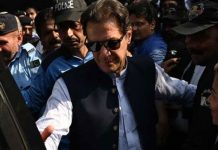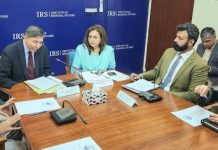ISLAMABAD: As relations between Islamabad and Dhaka continue to make strides following the ouster of Sheikh Hasina, Bangladeshi experts have called for joint efforts with Pakistan against the scourge of Indian Hindutva, The News reported on Sunday.
Speaking at an international conference on Pak-Bangladesh relations at the Pakistan National Council of Arts in Islamabad, the Bangladeshi participants expressed solidarity with Pakistan and underscored the importance of unity among the Muslims of South Asia.
Organised by Rafah International University, Global Youth Association, Pak Social Alliance and Pakistan Civil Society, the event was attended virtually by several international scholars including Dr Professor Shahiduzzaman — former Dean of Dhaka University.
The participants further stressed the need to move forward together for common peace, prosperity and development.
“We are tied by historical bonds. We have gone through periods of ups and downs but we’ve always realised that we need each other,” Prof Shahiduzzaman said.
“I feel so privileged that we are on the right track to know each other better. We are on the right track to recognise the fact that we are confronted by a great enemy,” he added.
Speaking at the conference, members of academia, youth leaders, social media activists and entrepreneurs from Pakistan highlighted the need to avoid fake news and recalled Bangladesh’s recent student-led movement as the “monsoon revolution”.
The conference comes in the backdrop of melting ice between the two neighbouring countries ever since the incumbent interim government led by Bangladesh Professor Muhammad Yunus came to power in Dhaka.
In September, Prime Minister Shehbaz Sharif met Prof Yunus on the sidelines of the 79th Session of the UN General Assembly.
During the meeting PM Shehbaz highlighted Pakistan’s strong fraternal ties with Bangladesh, based on common faith, history and culture and encouraged fostering relations through parliamentary exchanges, people-to-people contacts, and interactions among sportspersons, academics, artists, students, etc.
Since then, the first-ever direct maritime link was established between the two countries after a cargo vessel reached Chittagong Port from Karachi.
This was followed by the purchase of 25,000 tons of high-quality sugar by Bangladesh from Pakistan, as reported by the publication in the first week of December which said that Dhaka had usually been importing sugar from India.
Apart from common economic interests, Pakistan and Bangladesh share mutual concerns relating to Indian aggression.
Earlier this month, around 50 members of a Hindutva group breached the Bangaldeshi consulate in India’s northeastern state of Tripura and brought down the Bangladeshi flag post.
The incident warranted a strong reaction from Dhaka which urged New Delhi to take immediate action against protesters.
Speaking at a gathering of political parties, Prof Yunus urged the country’s politicians to keep differences at bay and put up a united front to counter “Indian aggression”.
“They are undermining our efforts to build a new Bangladesh and are spreading fictitious stories [….] They have spread these rumours in particular countries and among influential players,” he said.
Yunus further called for unity against what he characterised as a disinformation campaign, describing the matter as “a question of our existence”.

















